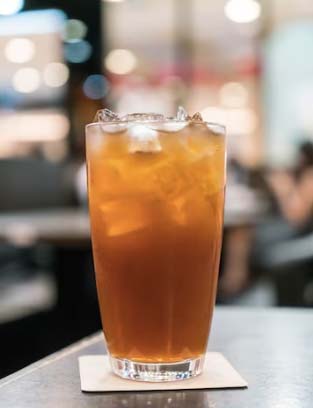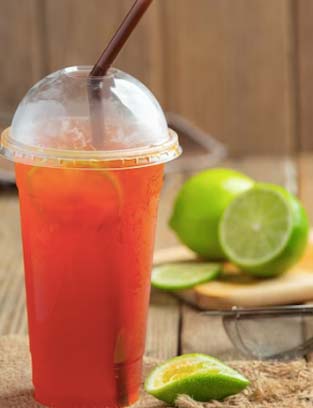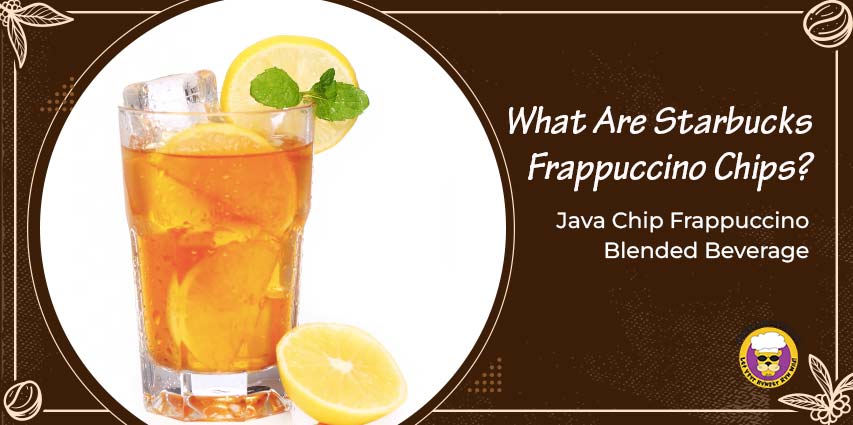Iced tea is a popular beverage that many people enjoy during hot weather or with their meals. But have you ever wondered How Much Caffeine in Iced Tea? The answer varies depending on several factors, such as the tea type, brewing method, and serving size.
In this post, we’ll discuss why some iced teas have more or less caffeine than others, as well as what kind of health benefits iced tea has if any. Whether you’re looking for a safe pick-me-up drink or simply curious about the amount of caffeine in your favorite summertime beverage.
What Is Caffeine?
Caffeine is a natural stimulant that belongs to a class of compounds called xanthines. It is found in various plants, most commonly in coffee beans, tea leaves, and cacao pods. Caffeine acts as a central nervous system stimulant, providing a temporary boost in energy, alertness, and concentration. It is one of the most widely consumed psychoactive substances worldwide.
What Is Iced Tea?
Iced tea is a refreshing beverage made by brewing tea leaves in hot water and then cooling the mixture with ice. It is a popular drink, especially during hot summer months, as it offers a flavorful and thirst-quenching alternative to hot beverages. Iced tea can be enjoyed plain or flavored with various additions such as lemon, sweeteners, fruits, or herbs.

Related article:
What Are Starbucks Frappuccino Chips? Java Chip Frappuccino Blended Beverage [2023]
How Much Caffeine in Iced Tea?

Caffeine content is a crucial consideration for many when choosing their preferred iced tea brand. Here’s an overview of the caffeine levels found in various types of iced tea:
- Black Tea: Black tea typically contains around 40-70 milligrams (mg) of caffeine per 8-ounce serving. However, the exact amount can vary depending on factors such as brewing time and water temperature.
- Green Tea: Green tea generally contains less caffeine than black tea, ranging from 25-45 mg per 8-ounce serving. This milder caffeine content makes it a popular choice for those seeking a more moderate energy boost.
- Herbal Teas: Herbal teas, including popular options like chamomile, peppermint, and hibiscus, are naturally caffeine-free. They provide a soothing and relaxing experience without any stimulant effects.
- Decaffeinated (Decaf) Tea: Decaf tea goes through a process to remove most of the caffeine present. While it won’t be completely caffeine-free, decaf tea typically contains significantly less caffeine than regular tea, often below 5 mg per serving.
Is Iced Tea high in caffeine?
The caffeine content in iced tea can vary depending on several factors, including the type of tea used, the brewing method, and the steeping time. Generally, iced tea contains less caffeine than its hot counterpart because the brewing process is often shorter.
Is Drinking Iced Tea Good For Health?
Drinking iced tea can have several potential health benefits. Tea is rich in antioxidants called cate chins, which have been associated with various health advantages, including reducing the risk of certain chronic diseases. Additionally, tea consumption has been linked to improved heart health, digestion, and hydration.
Does Iced Tea Have More Caffeine Than Hot Tea?
In general, iced tea tends to have less caffeine compared to hot tea. The brewing process for iced tea involves steeping the tea leaves in hot water for a shorter period, resulting in a lower caffeine extraction.
However, it’s worth mentioning that certain types of iced tea, such as black tea or green tea, can still contain significant amounts of caffeine. It’s always advisable to check the specific caffeine content of the tea you are consuming if you are concerned about your caffeine intake.
How to Reduce Caffeine in Iced Tea?
If you prefer to reduce the caffeine content in your iced tea, there are a few methods you can try:
- Opt for herbal teas: Herbal teas, such as chamomile or peppermint, are naturally caffeine-free and can be used as a base for iced tea.
- Blend caffeinated and decaffeinated teas: By mixing equal parts of caffeinated and decaffeinated tea, you can lower the overall caffeine content in your brew.
- Shorten the steeping time: Steeping tea for a shorter duration can help reduce the caffeine extraction. Aim for around 1-2 minutes instead of the usual 3-5 minutes.
- Choose white or green tea: White and green teas generally contain less caffeine than black tea. Using these varieties as the base for your iced tea can result in lower caffeine levels.
What’s the Difference Between Black Tea and Other Teas?
The main difference between black tea and other teas, such as green, white, and oolong tea, lies in the level of oxidation during processing. Black tea undergoes full oxidation, where the tea leaves are exposed to air for an extended period, resulting in a dark-colored brew with a robust flavor. Green tea, on the other hand, is minimally oxidized, preserving its natural green color and delicate taste. White tea is the least processed, made from young tea leaves or buds that are typically not oxidized at all.
What are the Effects of Caffeine on Iced Tea?
Caffeine in iced tea can have various effects on the body, including:
- Increased alertness: Caffeine stimulates the central nervous system, promoting wakefulness and reducing fatigue.
- Enhanced concentration: Consuming moderate amounts of caffeine may improve focus and cognitive performance.
- Diuretic effect: Caffeine can act as a mild diuretic, which means it may increase urine production. However, the diuretic effect of caffeine is often exaggerated and can be offset by the hydration provided by the iced tea itself.
- Increased heart rate: Caffeine can temporarily raise heart rate and blood pressure due to its stimulant effects on the cardiovascular system. This effect is usually mild and well-tolerated by most individuals.
- Potential sleep disturbances: Consuming caffeine, especially in large amounts or close to bedtime, can interfere with sleep quality and make it difficult to fall asleep. It is recommended to avoid consuming caffeinated beverages too close to bedtime.
- Possible digestive effects: Some people may experience mild gastrointestinal discomfort, such as increased stomach acid production or bowel movements, after consuming caffeine. However, these effects are generally minimal and vary between individuals.
It’s important to note that individual sensitivities to caffeine can vary greatly. While many people enjoy the stimulating effects of caffeine, others may need to limit their intake due to personal preferences or health considerations.
How Many Iced Tea Can You Drink A Day?
The number of iced teas you can consume in a day depends on various factors, including your caffeine sensitivity, overall health, and lifestyle. Moderate caffeine consumption is generally considered safe for most healthy adults, which translates to about 200-300 milligrams of caffeine per day. This equates to approximately 2-3 cups of iced tea made from black tea.
How Much Caffeine Is in Coffee, Tea, Cola, and Other Drinks?
Caffeine content can vary widely among different beverages. Here’s a general overview of the approximate caffeine content in common drinks:
Caffeine in Coffee
- Regular brewed coffee (8 oz): 95-165 mg
- Decaffeinated coffee (8 oz): 2-5 mg
Caffeine in Espresso
- Espresso (1 oz): 63 mg
Caffeine in Tea
- Black tea (8 oz): 30-50 mg
- Green tea (8 oz): 20-30 mg
Caffeine in Iced Teas
- Caffeine levels vary depending on the type of tea used and brewing method. On average, an 8-ounce cup of iced tea made from black tea contains around 30-50 mg of caffeine, while green tea-based iced teas typically have 20-30 mg per serving.
Caffeine in Colas and Sodas
- Coca-Cola (12 oz): 34 mg
- Pepsi (12 oz): 38 mg
Caffeine in Energy Drinks
- Energy drinks can vary significantly in caffeine content, ranging from 50 mg to over 200 mg in a standard 8-ounce serving. It’s essential to check the label for specific information.
Caffeine in Chocolate & Chocolate Drinks
- Dark chocolate (1 oz): 20 mg
- Milk chocolate (1 oz): 6 mg
- Chocolate-flavored drinks: The caffeine content can vary depending on the brand and serving size. It’s advisable to review the packaging for accurate information.
Caffeine-Free Herbal Teas
- Herbal teas are generally caffeine-free, as they are not made from tea leaves. Popular caffeine-free herbal teas include chamomile, peppermint, rooibos, and hibiscus.
Caffeine in Iced Tea from Dunkin’ Donuts
- Dunkin’ Donuts is a popular destination for coffee lovers, but they also serve refreshing iced tea options. Their iced tea contains around 53 mg of caffeine per 16-ounce serving.
Caffeine in Arizona Iced Tea
- Arizona Iced Tea is notorious for its large, colorful cans and unique flavors. The caffeine content in Arizona iced tea varies depending on the flavor and size of the beverage. On average, an 8-ounce serving of Arizona Iced Tea contains around 15-30 mg of caffeine.
Caffeine in Brisk Iced Tea
- Brisk is another well-known brand offering a diverse selection of iced tea flavors. The caffeine content in Brisk iced tea ranges from approximately 5-10 mg per 8-ounce serving.
Caffeine in Unsweetened Iced Tea McDonald’s
- McDonald’s, famous for its fast-food offerings, also serves iced tea as a refreshing beverage option. Their unsweetened iced tea contains approximately 20-30 mg of caffeine per 16-ounce serving.
Caffeine in Lipton Iced Tea 500ml
- Lipton offers various packaging sizes for their iced tea products, including larger 500ml bottles. The 500ml bottle of Lipton iced tea usually contains around 31-50 mg of caffeine.
Caffeine in Nestea Iced Tea
- Nestea is a popular brand that offers a range of iced tea flavors. The caffeine content of Nestea iced tea varies depending on the flavor and size of the beverage. On average, an 8-ounce serving of Nestea iced tea contains approximately 26-45 mg of caffeine.
Home-Brewed Iced Tea from Black Tea
When preparing iced tea at home using black tea, you can control the brewing process and customize the strength according to your preference. Here’s a simple method to make home-brewed iced tea:
- Boil water in a kettle or saucepan.
- Place black tea bags or loose tea leaves in a heat-safe pitcher.
- Pour the boiling water over the tea and let it steep for 3-5 minutes, or according to the package instructions.
- Remove the tea bags or strain out the tea leaves.
- Allow the brewed tea to cool to room temperature.
- Fill a glass with ice and pour the cooled tea over it.
- Add any desired sweeteners, fruits, or herbs for flavor if desired.
- Stir the tea to incorporate the flavors and chill it further in the refrigerator if desired.
- Serve the iced tea cold and enjoy!
Feel free to adjust the amount of tea leaves, steeping time, and additional ingredients according to your taste preferences. Experiment with different flavors and combinations to create your perfect glass of refreshing homemade iced tea.
Is Iced Tea Better for Hydration Than Water?
While iced tea can contribute to your daily fluid intake, water is generally considered the best choice for hydration. Water is essential for maintaining proper bodily functions and is calorie-free and readily available. However, iced tea can still provide hydration benefits, especially if it is unsweetened or lightly sweetened.
It’s important to note that certain additives commonly found in iced tea, such as sugar or artificial sweeteners, can affect its overall nutritional value and potential health benefits. Be mindful of the ingredients used when consuming iced tea for hydration purposes.
Can Children Drink Iced Tea?
Children can drink iced tea in moderation, taking into account their age, caffeine sensitivity, and overall dietary habits. It’s worth noting that children are generally more sensitive to caffeine than adults, and excessive caffeine consumption can lead to sleep disturbances, restlessness, and other potential side effects.
If offering iced tea to children, it’s advisable to choose decaffeinated varieties or dilute caffeinated tea with water to reduce the caffeine content. Additionally, be cautious about added sugars or artificial sweeteners, as excessive intake can contribute to unhealthy weight gain or other health issues.
As always, it’s recommended to consult with a pediatrician or healthcare professional for personalized advice regarding the suitability of iced tea for your child.
Store-Bought Iced Tea Most Popular Brands
Store-bought iced tea has become a popular choice for many people seeking a refreshing and convenient beverage. With a wide array of options available, it can be overwhelming to decide which brand to choose. In this article, we will explore the most popular brands of store-bought iced tea and delve into interesting facts, caffeine content, and various flavors available.
Which Type of Iced Tea has the Most Caffeine?
Among different types of teas, black tea typically contains the highest amount of caffeine. Therefore, iced teas made from black tea tend to have a higher caffeine content compared to those brewed from green, white, or herbal teas. However, it’s essential to remember that the exact caffeine content can still vary depending on factors like brewing time, water temperature, and the specific brand or variety of tea used.
Iced Tea With Ginseng And Honey
Ginseng and honey are two delightful additions that can elevate the taste and potential health benefits of your iced tea. Here’s what you need to know about this enticing combination:
- Ginseng: Known for its adaptogenic properties, ginseng is believed to help reduce stress, boost energy levels, and improve mental clarity. When combined with iced tea, it adds a subtle earthy flavor and provides an invigorating kick.
- Honey: Adding a touch of sweetness, honey not only enhances the taste of iced tea but also offers potential health benefits. It contains antioxidants and antimicrobial properties, making it a natural alternative to refined sugars for sweetening your tea.
Iced tea with ginseng and honey is a harmonious blend of flavors that offers a refreshing and revitalizing experience. It’s a perfect choice for those seeking a unique twist to their iced tea enjoyment.
Iced Tea With Pomegranate
Pomegranate brings a burst of tangy sweetness to the world of iced tea. Here’s why you should consider indulging in the flavorful combination of iced tea with pomegranate:
- Antioxidant-Rich: Pomegranates are packed with antioxidants, particularly polyphenols. These compounds help protect against oxidative stress and inflammation, promoting overall well-being.
- Vibrant Flavor: The natural sweetness and tartness of pomegranate lend a refreshing and enjoyable taste to iced tea. It adds a vibrant touch to your beverage, making it visually appealing as well.
- Refreshing Hydration: Iced tea with pomegranate provides a delicious way to stay hydrated, especially during warm weather. It’s a great choice for those looking for an alternative to sugary drinks while satisfying their taste buds.
Iced teawith blueberry creates a delightful fusion of flavors that will tantalize your taste buds. Here’s why you should give iced tea with blueberry a try:
- Antioxidant Powerhouse: Blueberries are renowned for their high antioxidant content, particularly anthocyanins. These antioxidants have been linked to various health benefits, including reducing inflammation and improving brain function.
- Burst of Sweetness: Blueberries offer a natural sweetness that pairs beautifully with the subtle bitterness of tea. The combination creates a harmonious blend of flavors, making each sip a delightful experience.
- Eye Health Support: Blueberries are also known for their potential benefits to eye health. The antioxidants found in blueberries may help reduce the risk of age-related macular degeneration and promote overall vision health.
Iced tea with blueberry is a refreshing and nutritious choice that combines the goodness of tea with the vibrant flavors of blueberries.
Iced Tea With Mandarin Orange
If you’re looking to add a citrusy twist to your iced tea, consider opting for the invigorating combination of tea with mandarin orange. Here’s what makes it a fantastic choice:
- Zesty Flavor: Mandarin oranges bring a burst of tangy and sweet flavor to your iced tea. The citrusy notes provide a refreshing and uplifting taste that can awaken your senses.
- Vitamin C Boost: Mandarin oranges are an excellent source of vitamin C, which plays a vital role in supporting immune function and promoting collagen production for healthy skin.
- Digestive Aid: Citrus fruits like mandarin oranges contain dietary fiber, which aids in digestion and helps maintain a healthy digestive system.
Iced tea with mandarin orange offers a citrus-infused experience that is both refreshing and beneficial to your well-being.
Factors Affect the Amount of Caffeine in Iced Tea?
Several factors influence the caffeine content in iced tea. Understanding these factors can help you make informed choices about the caffeine levels in your preferred iced tea brand. The following elements play a role:
- Tea Type: Different types of tea, such as black, green, white, or oolong, have varying caffeine content. Black tea generally contains the highest amount of caffeine, followed by oolong and green tea.
- Brewing Time: The longer you steep your tea, the higher the caffeine extraction. If you prefer a milder caffeine kick, opt for shorter steeping times.
- Water Temperature: Hotter water extracts more caffeine from the tea leaves. Lowering the temperature can result in slightly lower caffeine levels.
- Leaf Grade: The grade and quality of the tea leaves used can affect caffeine content. Finer-grade leaves may release more caffeine compared to coarser-grade leaves.
- Blending Ingredients: Some flavored iced teas may contain additional ingredients like herbs, spices, or fruits that can influence the overall caffeine content.
How to Calculate the Amount of Caffeine in Iced Tea?
Calculating the exact amount of caffeine in your homemade iced tea can be challenging due to the variables involved. However, you can estimate the approximate caffeine content using the following guidelines:
- Know Your Tea: Research the typical caffeine content of the tea variety you’re using. This information is usually available from the tea manufacturer or online resources.
- Measure the Tea: Use a standard measuring spoon to measure the tea leaves or tea bags. Aim for consistent measurements to get accurate results.
- Steeping Time: Be mindful of the recommended steeping time for the type of tea you’re using. Adhering to the suggested time frame helps maintain consistency.
- Consider Water Temperature: Brewing your tea at the recommended temperature ensures optimal caffeine extraction. Follow the instructions provided with your tea or use a suitable temperature range for the tea type.
- Understand Serving Size: Determine the serving size of your iced tea. This is crucial for calculating the caffeine content per serving accurately.
FAQs
Q: Can I add sweeteners to my unsweetened iced tea if I prefer a sweeter taste?
A: Absolutely! You have the freedom to customize the sweetness of your unsweetened iced tea by adding natural sweeteners like honey or stevia, or even opting for flavored syrups. Experimentation is key to finding your preferred level of sweetness.
Q: Is herbal iced tea suitable for children and individuals sensitive to caffeine?
A: Yes, herbal teais a great option for children and individuals sensitive to caffeine. Herbal teas are naturally caffeine-free, making them a safe and enjoyable choice for all ages.
Q: Are there any health benefits associated with drinking iced tea?
A: Yes, iced tea offers several potential health benefits. Tea is rich in antioxidants, which can help protect against cell damage and support overall well-being.
Q: Can I store homemade iced tea in the refrigerator for later consumption?
A: Absolutely! Homemade iced tea can be stored in the refrigerator for several days, allowing you to enjoy it at your convenience. However, be sure to keep it covered to prevent any contamination and maintain its freshness.
Conclusion
By now it should be clear that the caffeine content in iced tea varies significantly depending on brewing method and type of tea used. Caffeinated beverages can provide a healthy source of energy if consumed in moderation, but it’s important to understand your personal tolerance for caffeine before indulging.
Luckily, labels on store-bought bottled teas typically display their caffeine content so you can make an informed decision about what best suits your lifestyle. Tea prepared at home is less likely to have a label and requires additional research. We hope our overview has provided clarity for those considering iced tea a beverage option.
I’m Kara Chavez, and I love coffee. I like to create some of the best coffees around – espressos, lattes, macchiatos – you name it. I strive for perfection in my coffee-making skills, and I take great pride in providing a delicious cup of joe to my customers.
I’ve been working in the coffee industry for years now, and I know everything there is to know about making a perfect cup of coffee. My passion for coffee shines through in every cup that I make, and I hope that you’ll stop by soon so that I can share my love of coffee with you!

